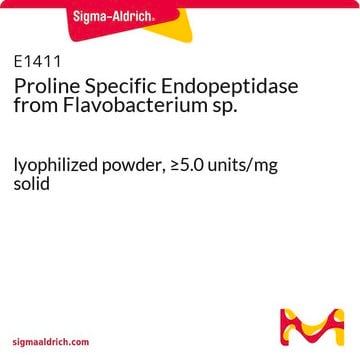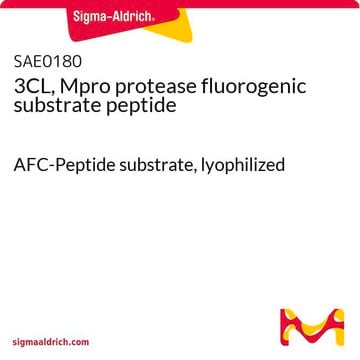P2289
Endoproteinase Lys-C from Lysobacter enzymogenes
lyophilized powder
Iniciar sesiónpara Ver la Fijación de precios por contrato y de la organización
About This Item
Número de CAS:
Número CE:
Número MDL:
Código UNSPSC:
12352204
Productos recomendados
Formulario
lyophilized powder
Nivel de calidad
clases químicas de analitos
amino acids
envase
vial of ≥3.0 units
temp. de almacenamiento
2-8°C
¿Está buscando productos similares? Visita Guía de comparación de productos
Descripción general
Endoproteinase Lys-C is an enzyme that preferentially cleaves at the carboxyl side of lysine residues.
Aplicación
Endoproteinase Lys-C from Lysobacter enzymogenes is useful in the determination of primary structures of proteins. It has been used in a study to investigate the evidence for trisulfide bonds in a recombinant variant of a human IgG2 monoclonal antibody.
Endoproteinase Lys-C has been used for the digestion monoclonal antibodies for disulfide bond assignment.
Acciones bioquímicas o fisiológicas
Endoproteinase Lys-C inactivates the enzyme inositol monophosphatase by cleaving it at a single site directly after Lys 36.
Definición de unidad
One unit will hydrolyze 1.0 μmole of N-p-tosyl-Gly-Pro-Lys p-nitroanilide per min at pH 7.7 at 25 °C.
Palabra de señalización
Danger
Frases de peligro
Consejos de prudencia
Clasificaciones de peligro
Eye Irrit. 2 - Resp. Sens. 1 - Skin Irrit. 2 - Skin Sens. 1 - STOT SE 3
Órganos de actuación
Respiratory system
Código de clase de almacenamiento
11 - Combustible Solids
Clase de riesgo para el agua (WGK)
WGK 3
Punto de inflamabilidad (°F)
Not applicable
Punto de inflamabilidad (°C)
Not applicable
Equipo de protección personal
dust mask type N95 (US), Eyeshields, Faceshields, Gloves
Elija entre una de las versiones más recientes:
¿Ya tiene este producto?
Encuentre la documentación para los productos que ha comprado recientemente en la Biblioteca de documentos.
Hiromi Ito et al.
Journal of chromatography. B, Analytical technologies in the biomedical and life sciences, 806(1), 11-17 (2004-05-20)
Formation of covalently bound protein adducts with 2-arylpropionic acids (2-APAs) has been proposed as a possible explanation for hypersensitivity and toxic responses to chiral carboxylic acid drugs. To identify the cellular proteins chemically modified with optically active (S)-ibuprofen, we generate
J G Jacobs et al.
Journal of virology, 85(23), 12537-12546 (2011-09-16)
Classical scrapie is a prion disease in sheep and goats. In sheep, susceptibility to disease is genetically influenced by single amino acid substitutions. Genetic breeding programs aimed at enrichment of arginine-171 (171R) prion protein (PrP), the so-called ARR allele, in
Wei Zhang et al.
Analytical biochemistry, 311(1), 1-9 (2002-11-21)
Recombinant monoclonal antibodies (mAbs) are an emerging therapeutic area. However, there are few reports on disulfide bond assignment of recombinant mAbs. This work describes the complete disulfide bond assignment of a recombinant immunoglobulin G4 (IgG4) mAb. N-ethylmaleimide (NEM) was used
The effects of substrates, products and other ligands on the susceptibility ofinositol monophosphatase to proteolysis by endoprotease lys-C.
Gee NS
FEBS Journal, 284, 95-97 (1991)
Pavlo Pristatsky et al.
Analytical chemistry, 81(15), 6148-6155 (2009-07-14)
The hinge region of human IgG2 contains four cysteine residues involved in disulfide linkages between the heavy chains, as well as the heavy and light chains. These linkages provide the fundamental framework of three distinct IgG2 disulfide isoforms recently described.
Nuestro equipo de científicos tiene experiencia en todas las áreas de investigación: Ciencias de la vida, Ciencia de los materiales, Síntesis química, Cromatografía, Analítica y muchas otras.
Póngase en contacto con el Servicio técnico










